


 |
|
Christianity was supposed to be about becoming like Jesus. |  |
||
| We went in the wrong direction. |
| |
|
What is the Right Church? |
|
What is church? |
||||||
|
Church = Ekklisia = "called out ones" |
||||||
|
From and to what are Christians called? |
||||||
 |
But ye are a chosen generation, a royal priesthood, an holy nation, a peculiar people; that ye should shew forth the praises of him who hath called you out of darkness into his marvellous light:
1 Peter 2:9 |
 |
||||
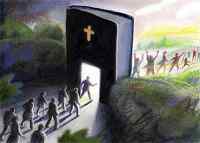 |
||||||
| Enter ye in at the strait gate: for wide is the gate, and broad is the way, that leadeth to destruction, and many there be which go in thereat:
Matthew 7:13 |
||||||
| Darkness | Light | ||
| Love not the world, neither the things that are in the world. If any man love the world, the love of the Father is not in him.
For all that is in the world, the lust of the flesh, and the lust of the eyes, and the pride of life, is not of the Father, but is of the world.
And the world passeth away, and the lust thereof: but he that doeth the will of God abideth for ever.
1 John 2:15-17 |
And this is the condemnation, that light is come into the world, and men loved darkness rather than light, because their deeds were evil.
For every one that doeth evil hateth the light, neither cometh to the light, lest his deeds should be reproved.
But he that doeth truth cometh to the light, that his deeds may be made manifest, that they are wrought in God.
John 3:19-21 |
||
| One might think that because Christians have been called out of darkness into the light of truth that churches would be places where love, light, truth, and kindness abound. | |
|
In fact, many churches are often filled with the worst aspects of the world and the flesh like greed, authoritarianism, self-indulgence, sanctimony, and ritualism that not only fail to help us become more like Jesus, but actually work to prevent us from even knowing that we are supposed to become like Jesus. For this reason it can be helpful to consider the purpose of the church. |
|
|
The Purpose of the Church |
|
| And he gave some, apostles; and some, prophets; and some, evangelists; and some, pastors and teachers;
For the perfecting of the saints, for the work of the ministry, for the edifying of the body of Christ:
Till we all come in the unity of the faith, and of the knowledge of the Son of God, unto a perfect man, unto the measure of the stature of the fulness of Christ:
That we henceforth be no more children, tossed to and fro, and carried about with every wind of doctrine, by the sleight of men, and cunning craftiness, whereby they lie in wait to deceive;
But speaking the truth in love, may grow up into him in all things, which is the head, even Christ:
Ephesians 4:11-15 |
|
|
||
| Why the church became so
ineffective in helping Christians become like Jesus
|
||
 |
Adopting Greek methods of
instruction
|
|
 |
The establishment of a priesthood
|
|
| Reducing the truth of God to
doctrinal axioms
Many early church leaders thought the best way to fight error was to develop creeds and declare doctrinal positions. While maybe well intentioned, this had the effect of turning Christians away from being personally guided by the Holy Spirit of truth and feeding on the "living" word of God to being dependent on a human authority to declare what was "right" with doctrinal "bullet-points".
|
||
 |
Preventing error
At first one has trouble thinking that preventing error could be wrong. However the Bible instructs us to correct error rather than prevent it. Attempting to prevent error just leads to the use of force and control that robs people of knowing truth and substitutes agreement or at least compliance with doctrinal dictums. Error is corrected by exposure to truth. The use of force just elevates a mechanical religious system and in fact institutionalizes error.
|
|
 |
The elevation of the collective
A religion machine provides members with the feeling that this many people can't be wrong,
|
|
 |
The making of Christianity into franchise brands
The reformation only removed some of Catholicism's most egregious errors. Ironically most of the form of Catholicism was kept in the numerous "flavors" of Christianity that were becoming available. Christianity was becoming market responsive and the market was moving away from God. |
|
|
|
| The church today | ||||
 |
Boring sermons Most church services consist of boring sermons because most seminary students sat through four years of boring lectures. The church auditorium is like a lecture hall. Even a gifted speaker using lots of entertaining anecdotes cannot help a person to grow to be like Jesus using just the power of a lecture. Paul said that if he preached according to the wisdom of men, he would make the cross of Christ of none effect. |
|||
 |
Church as theater
Some have attempted to make church attractive by relying on the old entertainment standbys of song and dance. There is a reason the Bible says that if you are a friend of the world, you are an enemy of God. |
|||
 |
Events instead of relationships
It is not just the church bingo hall, but Christmas pageants, musical performances, and even pot luck dinners that substitute for time spent growing in the likeness of Christ. The selflessness of Christ is replaced with the self-elevating process of the consumption of diversion. |
|||
 |
Services instead of ministry
Often churches are measured by how well they help their members pursue selfishness. The abandonment of children in order to seek the riches of the world or the age segregation of classes so that children are even less likely to see their parents as a source of spiritual instruction are the often unintended consequences of such consumer oriented "services" |
|||
 |
Activity instead of growth
Sunday school was once described as three bullet points and a lot of bad coloring. Much church activity is busyness disguised as instruction. |
|||
 |
The appeal of conservatism
The satisfaction of rule following success, the elevation of conservative political principles, and the self-affirmation of doing what is "right" make those attracted to conservative churches guilty of elevating the flesh over the spirit. |
|||
 |
The appeal of liberalism
The satisfaction of contributing to social justice, ecumenicism, liberal political principles, and the self-affirmation of doing what is "right" make those attracted to liberal churches guilty of elevating the flesh over the spirit.
|
|||
 |
The appeal of the world
Amusement, entertainment, and distraction are tactics Satan uses to keep captive the world. When he can get churches to follow this pattern, he wins an endorsement of his methods as well as more direct access to those he desires to ruin. |
|||
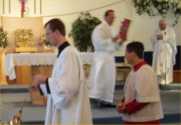 |
The comfort of the familiar derived from the traditions of men
We can have a strong sentimental attachment to ritual and tradition. Sometimes churches incorporate this sentiment into their activities and people begin to see what makes them comfortable as being sacred. |
|||
 |
Criteria based salvation
Some churches declare a specific take on salvation and those who become members get the "inside track" to heaven. |
|||
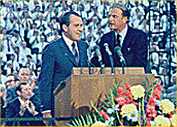 |
Easy believism
Some churches guarantee a "ticket to heaven" with the performance of some act such as baptism, saying a particular prayer, coming forward at an event, or other special act. |
|||
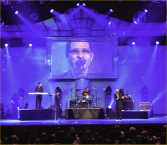 |
Spectacularism
Some churches compete with events such as rock concerts to draw people attracted to the spectacular. The problem with this approach is that, like a narcotic, the effects of wonder and awe fade quickly and are not so easily duplicated with the same dosage. |
|||
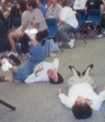 |
Ecstaticism
Many churches have an expectation that its members will at some point vocalize sounds, writhe uncontrollably, or even roll on the floor laughing as proof that they are touched by the divine. |
|||
| The church as it should be | ||
| truth | The Bible speaks of growing into the image of Christ (who is truth). John writes that he has no greater joy than to hear that his children are walking in truth. The Bible tells us that we should walk in the Spirit (who is truth and leads us in truth). Jesus tells us that if we live in His word, we will know the truth and it will make us free. | |
| love | We can read in 1 Corinthians 13 the Biblical definition of love. It is essentially selflessness. It is the decrease of self that gives victory of the spirit over the flesh and detaches us from the deceptions of the world. | |
| one another | The true church is the body of Christ. Christ lives in us and we are supposed to be growing into the image of Christ. We are supposed to selflessly serve one another, bear one another's burdens, and show the world the love of Christ through our love for each other. | |
| Where does all of this leave us? | ||
| Since we can't open the
telephone book and find the "right church" denomination,
franchise brand, or organizational system, we are left with the same
choices Christians had during the early church years. We find others who
are like minded about really growing into the image of Christ and we
huddle together against a world filled with perversion, deception, and hatred
of truth.
|
||
| If we need instruction, we need
to seek out older wiser Christians who clearly show the light and love of
Christ in their lives and ask them to help us learn to know Jesus like
they do.
|
||
| We need to be in prayer for
wisdom, understanding, and discernment. We need to be in prayer that the
Lord would lead us to others with whom we can have real fellowship.
|
||
| We are not as alone as one
might think. The God that created and runs the universe is within us
and cares for us. He told us that a great apostasy would come. We should
not be surprised that many chase after false churches.
Therefore be ye also ready: for in such an hour as ye think not the Son of man cometh. Who then is a faithful and wise servant, whom his lord hath made ruler over his household, to give them meat in due season? Blessed is that servant, whom his lord when he cometh shall find so doing. Matthew 24:44-46 |
||
|
|